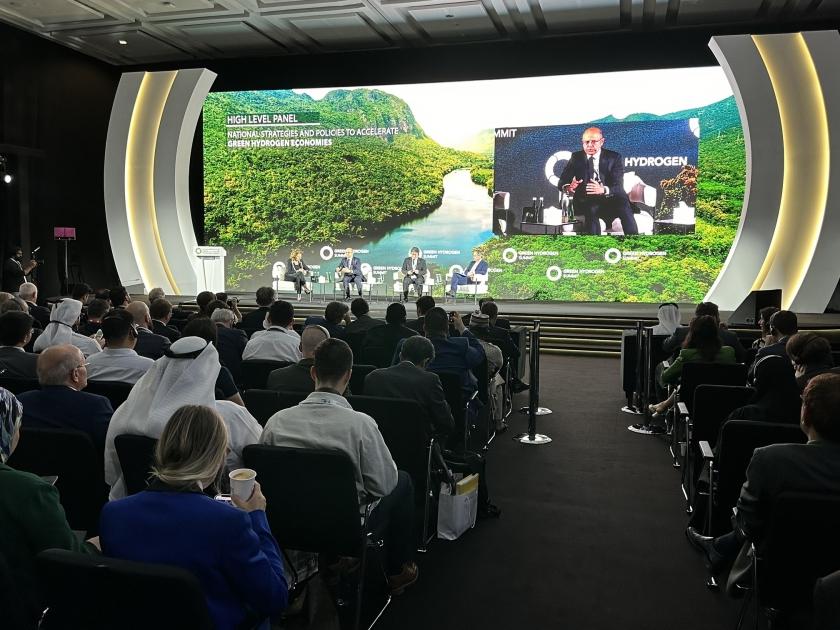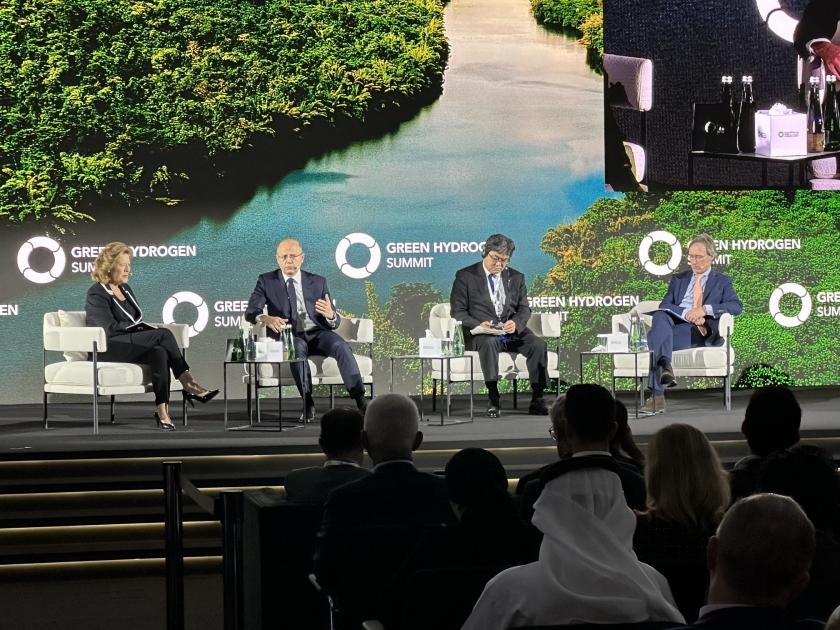"Green" ambitions: Azerbaijan's push for hydrogen production Caliber.Az review
In parallel with the development of solar, wind and hydropower in the world, work is underway on other types of alternative fuel. Hydrogen fuel seems to be the most promising; today, increasing attention is being paid to the development of capacities for its production, including in the post-Soviet space. In the future, Azerbaijan also plans to use wind power in the Caspian Sea to produce “green” hydrogen, exporting it to EU countries. In our country, work is underway to create a hydrogen strategy, and leading trends in this area are being studied. A logical continuation of this line is the participation of the Minister of Energy of the Republic of Azerbaijan Parviz Shahbazov in the II annual summit on “green” hydrogen in Abu Dhabi (UAE).
Held for the second time at the initiative of Abu Dhabi Future Energy (Masdar), the three-day summit aims to accelerate the development of the global green hydrogen economy and support the clean energy transition as part of the UN's global energy transition initiatives. The Green Hydrogen Summit, as well as the concurrent 14th Session of the International Renewable Energy Agency (IRENA) Assembly from 16-18 April, brought together numerous stakeholders, including policymakers, industry leaders, investors and innovative entrepreneurs at the ADNEC Exhibition Complex in Abu Dhabi. Under the overarching theme “Building the Hydrogen Economy: From Dialogue to Reality,” the summit will provide a platform to engage leading industry players around the world in in-depth discussions on developing a low-carbon hydrogen economy and supporting international trade in green hydrogen. On the sidelines of the forum, high-level discussions and working sessions will take place, participants will have the opportunity to familiarize themselves with the latest industry trends and developments in the field of production, conversion, transportation, storage and use of green hydrogen, and will also hear reports on the importance of hydrogen fuel in the decarbonization of the global energy system.

“Azerbaijan has already included issues of hydrogen production in various strategic documents, including the main strategy for the country’s socio-economic development which also includes points on the development of the hydrogen industry and the use of its resources both for the domestic market and for export. The territories of our country liberated from occupation have also been declared a green energy zone and hydrogen will be produced here as well," Azerbaijani Energy Minister Parviz Shahbazov told a ministerial panel on "National Strategies and Policies to Accelerate Green Hydrogen Economy" at a summit in the UAE. According to him, there is a huge potential in the Caspian Sea for wind generation, estimated at about 157 GW, and this huge volume is many times higher than the country's needs. In this regard, the Minister emphasised that Azerbaijan is intensively cooperating with the EU in order to export "green" hydrogen produced by wind energy to the European market in the future. The Minister expressed confidence that "green" hydrogen is important for strengthening Azerbaijan's position in energy supply through new energy sources and promising energy corridors (via the Caspian and Black Sea), as well as necessary to reduce carbon dioxide emissions by 40% by 2050 within the framework of country commitments under the UN Climate Convention. As Minister P. Shahbazov noted during the Abu Dhabi summit, promotion of projects in the field of "green" hydrogen is also planned during the 29th session of the Conference of the Parties to the UN Framework Convention on Climate Change (COP29), which will be held in November this year in Baku.

It is noteworthy that the hydrogen track is being developed most intensively today in the Old World countries: in September 2022, the European Commission approved the "IPCEI Hy2Use" project aimed at developing hydrogen fuel infrastructure in 13 EU countries. In general, the "Hydrogen Strategy for a Climate Neutral Europe" is designed to last 30 years and envisages investments of €470 billion in the construction of electrolysis facilities. Today, the countries of Northern Europe, in particular Finland, Denmark, Germany, Switzerland and Spain, where large hydrogen production projects have been launched, are at the forefront of hydrogen industry development. The priority for the EU is to ensure the production of renewable hydrogen to at least 10 million tonnes by 2030, with an additional 10 million tonnes to be imported.
The measures taken in the EU are also extremely important for our country, as the European market is seen as the main one not only for the supply of Azerbaijani natural gas, but in the future also for "green" hydrogen. The fact that the implementation of such plans is not far off is evidenced by the steps taken by the TAP AG consortium to test the Trans Adriatic Pipeline (TAP) for hydrogen supplies: these studies began in 2021, and in January this year tests were conducted to assess the technical possibilities of transporting a mixture of natural gas and hydrogen through the TAP pipeline. Experience has confirmed the feasibility of such combined supplies, and with strong demand and the development of the hydrogen market in Europe, the concentration of hydrogen in the TAP pipeline could gradually be increased.
Acting in a forward-looking manner, Azerbaijan has accelerated steps to explore the potential of the hydrogen cluster, for the development of which international partners and investors are being attracted. "Azerbaijan is taking preliminary steps to create a hydrogen strategy: in 2023, the European Bank for Reconstruction and Development (EBRD) presented an initial study that confirmed the competitiveness of Azerbaijan's green hydrogen exports in the European market. The initial steps show that our country has serious potential in this field," Azerbaijani Deputy Energy Minister Elnur Soltanov said on Monday. He also noted that as additional steps it is planned to establish work with international consulting companies based on the EBRD's initial report in order to prepare a country hydrogen strategy.
To recall, work is underway to develop a hydrogen strategy for Azerbaijan with EBRD support: an interagency working group has been established to develop the strategy in 2021, and with EBRD support, Advision consulting company is involved in the development of the Low Carbon Hydrogen Economy Market Study. The country document being developed covers current and future demand, existing and projected production, cost analyses of hydrogen production, regulatory and financial context, and an assessment of low-carbon hydrogen export opportunities in the global energy market.
Another important step towards implementing the country's hydrogen ambitions was the signing of a memorandum between the Ministry of Energy and the UAE Ministry of Investment in January 2024, according to which the construction of 6 GW wind farms in the Azerbaijani sector of the Caspian Sea and joint implementation of projects for the production of "green" hydrogen and ammonia, as well as synthetic methane are planned. Masdar from the UAE is expected to be the leading partner in these projects.
"There is still a lot to be done for the clean hydrogen industry to flourish, for the use of hydrogen to change the rules of the game of the climate agenda: we need specific national strategies, legal frameworks, regulatory measures and, of course, competitive production, infrastructure and significant investments in this field. In addition, creating a reliable global supply chain is crucial: we are actively working on all these aspects," said the head of Azerbaijan's energy ministry, speaking at the summit in the UAE.







